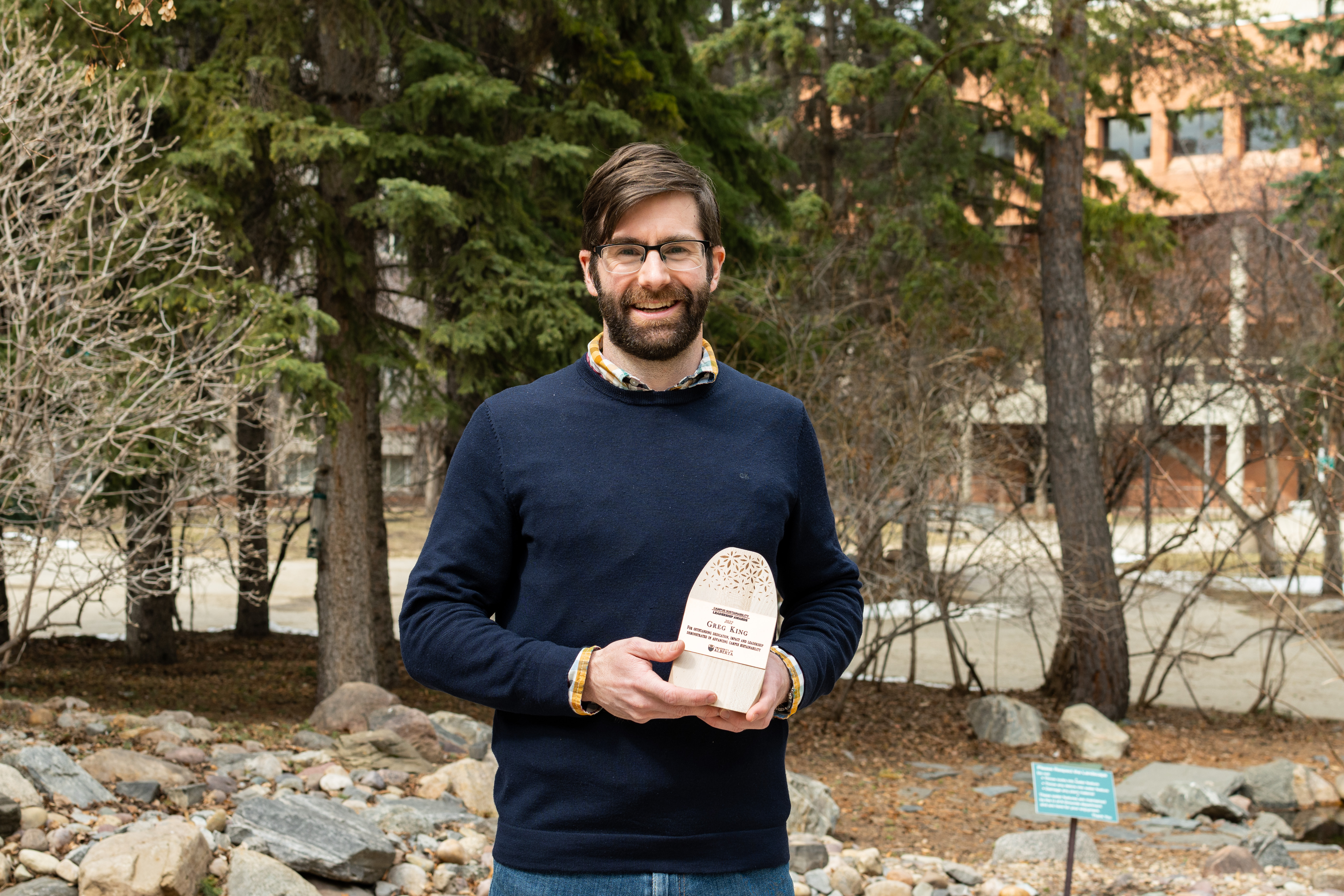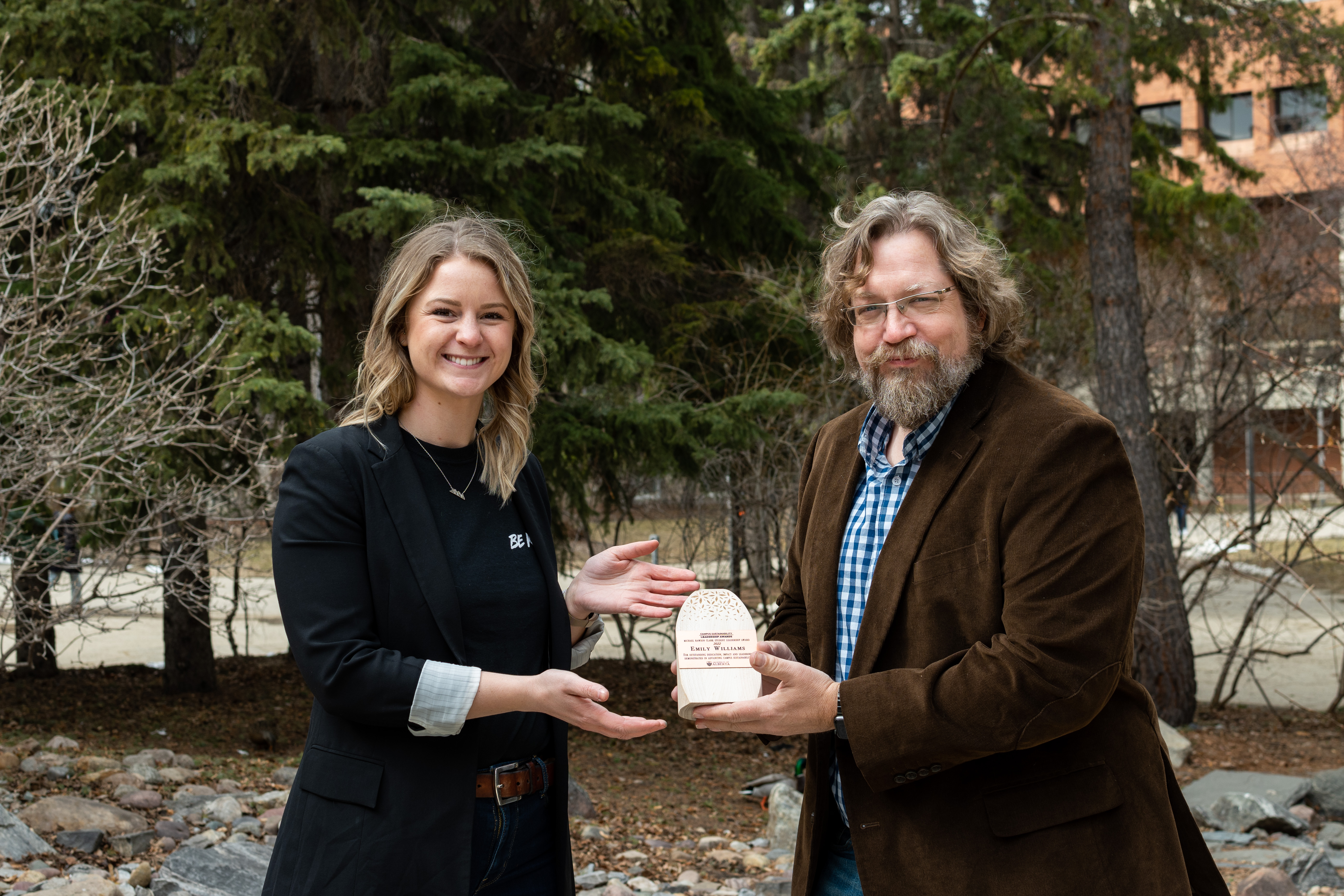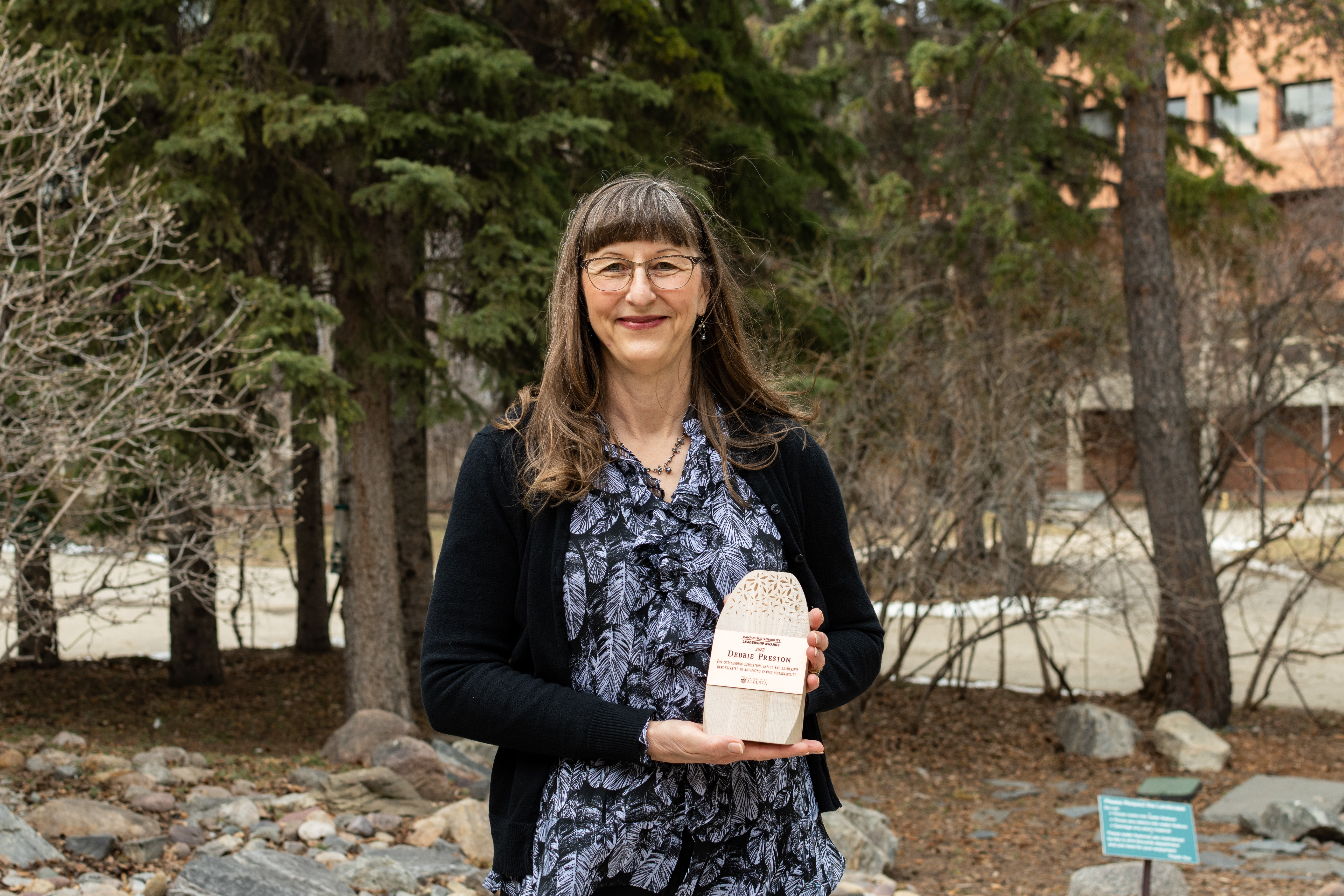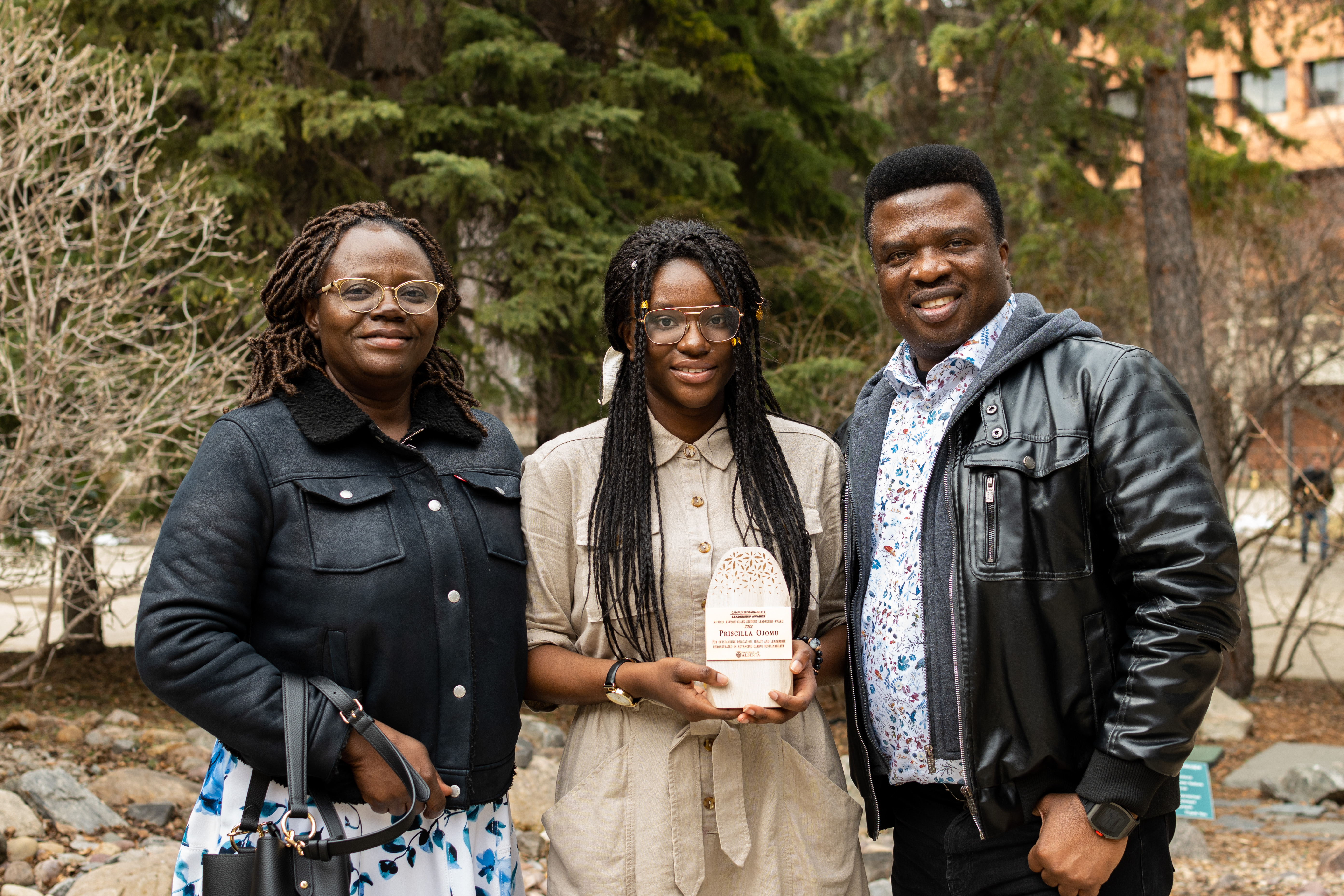Meet 2022’s Campus Sustainability Leaders Award winners
Here are the winner’s of this year’s Campus Sustainability Leaders awards!

Greg King © Hussain Al-Rikabi
“Tree tours,” micro-orchards, and community-service learning: Greg King wants students and Augustana community members to be outside, engaging with the natural environment that exists within urban spaces
Environmental science professor Greg King thinks that the best way to encourage learning about sustainability issues is through sharing stories and sparking curiosity in the familiar.
That’s why he started doing “tree tours” around the university’s Augustana campus in Camrose, where he teaches. Inspired by a project in which King and his students documented every tree growing in the neighbourhood near the school, these guided walks are open to any Camrose community member and highlight the importance of the city’s urban forest.
“I think people get stoked when we point out that nature is all around us, even in cities,” King said. “It allows people to see something new about a familiar area. Everyone loves trees, and this gives us a way to point out environmental issues by talking about how many kilograms of carbon dioxide these trees are pulling out of the air or how much water they are intercepting, for example.”
The tree tours are one of many projects King has spearheaded or been involved with that promote sustainability by getting people talking and taking action outside of the classroom.
The Augustana campus Berta Briggs Micro-Orchard, pitched to the university by King and planted in 2020, houses apple trees, haskap and Saskatoon bushes, and asparagus and rhubarb plants, among others. King had the idea for the orchard when, during his survey of the trees growing on campus, he noticed a lack of food-bearing vegetation.
“It allows students and community members to partake in the care of trees and see the possibilities around what you can make in a landscape, but also partake in harvesting, seeing that food comes from your own backyard sometimes and not just the grocery store,” he said.
In the classroom, King champions community-service learning, in which students work with Camrose businesses and organizations to tackle sustainability problems. He said that he has seen some remarkable outcomes from the program, such as a student group that paired with a local farm to find biodegradable packaging for the farm’s products.
He’s also trying to revive a sustainability-focused student organization on campus, was instrumental in the creation and design of the sustainability studies major at Augustana, and sits on the Sustainability Council.
“My motivation is the climate crisis,” he said. “All of these efforts come back to that, and thinking about the actions we can take as individuals or as a community, be that the campus community or the community of Camrose.”

Emily Williams and Robert Summers © Hussain Al-Rikabi
Emily Williams uses her communication skills to share stories that invite audiences to produce less trash and think about sustainability
According to her friends and colleagues, Emily Williams is the person to call for waste-reduction and sustainability tips.
It’s not just that Williams has experience working in environmental conservation and with Edmonton’s Waste Services department, volunteers for the nonprofit Waste Free Edmonton, and has a Bachelor of Science in Environmental and Conservation Sciences from the U of A—she also knows how to communicate sustainability topics in a way that invites others to to be conscious of their impact on the natural environment.
That’s why the second-year Bachelor of Education After Degree student signed on to co-host Becoming Less, a podcast by Waste Free Edmonton that is focused on sustainability.
“I was really excited about the podcast because I think being sustainable can seem overwhelming and difficult,” Williams said. “I think it’s really important to have positive and uplifting conversations about being less wasteful, climate action and green initiatives, and to remind ourselves that what we’re doing isn’t small.”
Downloaded over 5,000 times, the podcast’s episodes cover everything from eco-friendly weddings, home renovations and travel to eco-grief, microplastics and the documentary film Seaspiracy.
Williams’s favourite episodes feature her sister’s many “zero waste fails.”
“My sister has a story of her buying this barrel of vinegar, because she was using vinegar for everything and wanted to buy in bulk,” Williams said. “It’s ridiculous to think that she had an entire barrel of vinegar when she was going to grad school in Toronto. Ok, don’t do that; don’t buy a barrel of vinegar because you don’t need to do that.”
Williams and co-host Bizz hope these stories help people embrace the many challenges of cutting waste from their lives in a world that doesn’t make doing so easy. “It’s funny, and it helps people feel more relaxed and realistic about some of their sustainability goals.”
Along with the podcast, Williams volunteers with Zero Waste Edmonton creating sustainability-focused content for their social media channels and doing public presentations about composting, recycling and waste disposal.
When she gets her first teaching gig, Williams hopes to share the many sustainability lessons she has learned with science students in high school and jr. high.
“I want to encourage people to do their best,” she said. “At some point in their life, every person is going to do something unsustainable. I think reminding people to leave shame behind is the biggest way that I can encourage people to live sustainably.”

Debbie Preston © Hussain Al-Rikabi
Debbie Preston’s efforts in the biological science storeroom help the university reduce waste
The biological sciences storeroom, where students and faculty can purchase lab and office supplies, has saved an estimated 13,464 plastic jugs from going to the landfill by reusing containers that store ethanol. It has sold over 6,600 packages of 30 per cent and 100 per cent recycled paper; roughly 7,000 biodegradable and recycled pens; and over 500 rechargeable batteries. Most of the over 52,000 non-rechargeable batteries it has sold have been recycled, preventing toxic waste from being absorbed into the soil around landfills.
The woman behind these numbers is Debbie Preston, the biological sciences storeroom administrator. Preston chooses and purchases all of the storeroom’s supplies, and she manages the storeroom’s sales, inventory, receiving and finances.
She started at the U of A in 1984 and worked with several different administrative offices before joining the biological sciences storeroom in 2005.
“For the first while I was overwhelmed,” she said. “I didn’t know anything about what I was selling, other than the office supplies, so it took me a few years to start seeking out some of the green options.”
Preston said that she hunts for the most eco-friendly stock available through the university’s preferred suppliers. This mission started when a supplier told her just how much paper the university was buying.
“I was shocked, and that was when I decided I better start offering a recycled paper option,” she said. “The price of the 100 percent recycled was quite a bit more, so I offered both 30 and 100 per cent so labs could choose, and it went very well.”
After the recycled paper proved successful, Preston began ordering other stock, such as biodegradable pens and rechargeable batteries, and has found these items to be just as popular with faculty, staff and students in the department.
She grew her mission to reduce waste from the storeroom by introducing new recycling programs. Many of the batteries used by the department—especially for fieldwork equipment—are sent to the waste disposal service CHEMATIX for recycling, thanks to Preston’s initiative. She also agreed to pilot a service for recycling pens and markers through the company TerraCycle, and runs a service for recycling ink cartridges, both of which have seen consistent use within the biological sciences department.
Preston said that the most challenging part of reducing waste in the storeroom is the extra time involved–because she is so busy–but she thinks helping to maintain Earth’s natural environment is worth the effort.
Her advice for anyone looking to reduce their environmental footprint?
“Start by taking small steps,” she said. “Once you start to do it, you’ll get used to it, and you may even get into it. But you have to start somewhere.”

Priscilla Ojomu and her parents © Hussain Al-Rikabi
Priscilla Ojomu’s online anti-discrimination project aims to spread awareness of prejudice and help victims
Taking to social media to discuss an experience involving discrimination can be harmful for the person who shares their story, according to third-year psychology student Priscilla Ojomu.
Doing so can invite harassment, bullying, and questions about the validity of the poster’s claims. There is also no guarantee that the victim of discrimination will find the resources to help them navigate what can be a traumatic experience. That’s why Ojomu and fellow psychology student Nancy Tangon created Canada Confesses, an online platform for anonymously sharing these stories.
“We specifically tried to make this project harm free, sustainable, and also non-performative,” Ojomu said.
When the team of over 40 volunteers at Canada Confesses receives an anonymous “confession,” they get to work researching the core social injustices, such as racism, discrimination, ableism, sexism and harassment, that are reflected in the victim’s experience. They then share their findings over social media, along with tailored links to resources, such as anti-racist non-profits and advocacy groups, and suggestions for allies who want to help end prejudice.
“The idea of confessions is to get people informed, especially people from non-marginalized groups who haven’t experienced the social issue in the confession, and to empower marginalized groups with resources to amplify their voices,” Ojomu said. “All of the confessions we’ve received so far have been very unique and different.”
Ojomu hopes that she can also reach people who may be skeptical of the need for Canada Confesses’ service. That’s why the website takes data from academic and government research to highlight how frequently people from marginalized groups encounter discrimination and the harmful effects of these experiences.
Launched in February of this year, the site has received confessions ranging from anti-Asian bullying in elementary school, to one message in which the confessor alleged that they missed out on income support due to their race.
“You learn a lot—even confessions that you think you have a good knowledge of, like in my case with anti-Black racism, the experience is unique to each individual,” Ojomu said.
“The most challenging part is the sense of doubt. Every day I wake up and wonder if this resource will help someone, or if this infographic will inform people. But it’s a good thing, because it ensures that I’m doing the work to make sure the project actually works.”
Ojomu is enrolled in the Certificate in Sustainability and the Certificate in Community Engagement and Service-Learning. She was a student representative on the the Arts Faculty Council and sits on the executive teams of the Undergraduate Psychology
Association, Black Students Association and the National Collective of Women in Business.
She was a member of the 2021-2022 cohort of the Alberta Council for Global Cooperation’s (ACGC) SDG Hub, which “helps young people in Alberta fulfill the mandate of the United Nations’ Sustainable Development Goals (SDGs)," and she is a member of the ACGC’s Global Connect Program.
“Getting recognized for Canada Confesses and for all the other projects I’m involved in is really reassuring,” she said. “It made me realize the work I’m doing is important and has the potential to make big, positive impacts.”